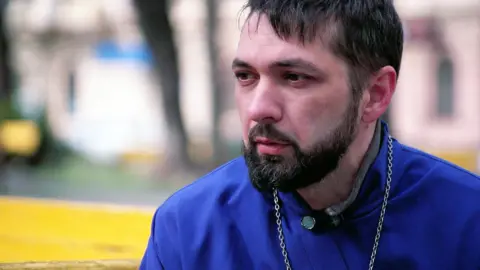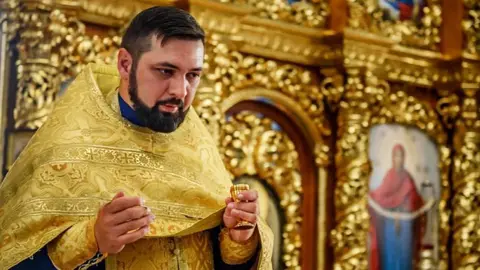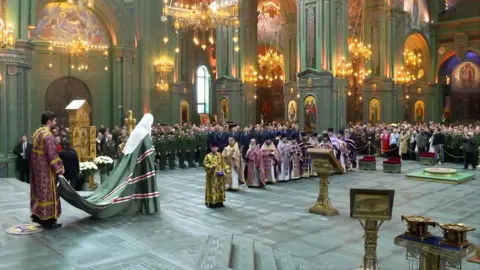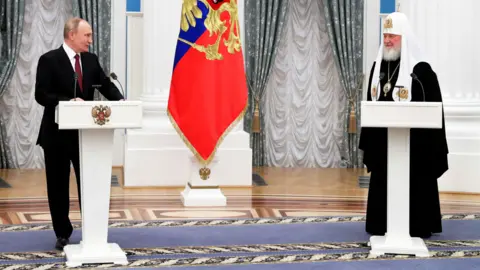'I'm shocked by my church leaders in Moscow' - priest in Ukraine
 BBC
BBCThe Russian Orthodox Church has echoed the rhetoric of the Kremlin in justifying the war in Ukraine. It is a stance that appears to be driving large numbers of Ukrainian priests and parishioners to turn their backs on Moscow.
"I will never forget the moment when I woke up early to go to mass, only to suddenly hear the shocking sounds of bombing," says Father Nicolay Pluzhnik.
"The wonderful woman who cooked at our church and her son, who was in a wheelchair, were both killed when an artillery shell hit their apartment. I now know of several other of our parishioners who have died."
Like most clergy in the region of north-eastern Ukraine where he is from, Father Pluzhnik belonged to the branch of the Russian Orthodox Church which takes its direction from its religious leadership in Moscow.
But now, he says, has applied to join the Ukrainian Orthodox Church - which was finally granted independence from the Russian Orthodox Church in 2019, in a move never recognised by Russia.
He says many fellow priests who followed Patriarch Kirill in Moscow are doing the same because of the Church leader's stance on the war.
 Father Nicolay Pluzhnik
Father Nicolay PluzhnikFather Pluzhnik and his family fled under artillery fire and now have a temporary new home in the town of Chernivtsi, in western Ukraine.
"When the war started, I was waiting to hear from Patriarch Kirill of Moscow, the 'father' of our church. But first there was no reaction at all, and then there was worse," he says.
"Patriarch Kirill blessed the Russian army and gave his blessing to the war. It was not just him but the majority of priests of the Moscow Patriarchate [Russian Orthodox Church] including some that even have Ukrainian roots. I was in shock."
As well as having failed to unequivocally condemn the killing of innocent people in Ukraine, or call for a ceasefire, the Patriarch has held large televised services in Moscow to bless Russian troops. He has also suggested in sermons that the Kremlin's war is a righteous one about the future of Christianity.
"What is happening today is much more important than politics," he said last month. "We are talking about human salvation, about where humanity will end up and on which side of God the Saviour."
 Russian Orthodox Church
Russian Orthodox ChurchThere are religious undertones in much of the Kremlin's narrative justifying its invasion of Ukraine. It is a fight for the conservative ideals of the Russian Orthodox Church based in Moscow, against an immoral outside world. President Putin has said Ukraine is not only an "inalienable part" of Russia's history and culture - but also its "spiritual space".
The former Archbishop of Canterbury, Dr Rowan Williams, has said he finds Patriarch Kirill's sentiment concerning.
"There are elements in the Russian Christian tradition that can become really toxic when they get in their head a particular kind of Christian nationalism, a sort of messianic approach to the fate of the nation," said Dr Williams during a visit to western Ukraine this week.
He was part of an extraordinary high-level, multi-faith delegation - including Christian, Jewish, Muslim, Hindu and Buddhist leaders. They met refugees who had fled the horrors in the eastern part of the country.
Dr Williams has long studied and written about the positive contribution of the Russian Orthodox Church, and appears deeply saddened by the role the Moscow Patriarchate is playing in the war.
"I think that the increasing influence in the Patriarchate of Moscow of ultranationalist ideals - often including a strand of anti-Semitism - has been going on for some time.
"And it has now expressed itself in this very uncritical support of Russian national ambitions, a very aggressive attitude towards many other Orthodox churches. The writing has been on the wall for some time," he said.
 Getty Images
Getty ImagesPatriarch Kirill has echoed President Putin's claim that Russian speakers and followers of Moscow's Russian Orthodox Church living in eastern Ukraine need liberating after years of oppression.
"Our brothers and sisters were really suffering, they suffer for their loyalty to the Church," said Patriarch Kirill a week into the war.
But Father Pluzhnik, a Russian speaker and a follower of the Moscow Patriarchate all of his adult life, is angered by those claims.
"When I hear them say they are protecting us and fighting some 'Holy War', I think they are either blind, or they are not serving God but the devil," he says.
"We were living peacefully until they came. But far from protecting us they bombed and tortured and killed. Before the war, parishioners were completely free to choose what church they went to, they just went to the church closest to their home. For many of them it was not even a significant difference to go to a church that followed Moscow or not, they just wanted to pray to God. Now that has changed."
Dr Sergii Bortnyk, a professor at the Kyiv Theological Academy and an adviser to the Russian Orthodox Church in Ukraine, acknowledges that there has been a widespread movement of people and parishes across the country abandoning their loyalty to Moscow.
"I think it is maybe half of the 12,000 parishes [of the Moscow Patriarchate in Ukraine] that have said that they want to break away now," says Dr Bortnyk.
"Patriarch Kirill has not said anything about all the Christians in Ukraine that have been killed, so I believe the members of our church are free to end their connection to him as the patriarch," he says.
"The connection to all of our [Moscow Patriarchate Russian Orthodox] Church in Ukraine to Moscow is in question now."
The Kremlin's aim, backed by the leadership of the Russian Orthodox Church in Moscow, had been to unite Russia and Ukraine in a single "spiritual space".
But the manner by which they have tried to achieve that appears to have had precisely the opposite effect.

War in Ukraine: More coverage
- UKRAINE: Battle for justice over alleged war crimes
- ANALYSIS: Why Russia wants to seize eastern Donbas
- ON THE GROUND: Collecting the dead in Bucha
- READ MORE: Full coverage of the crisis

